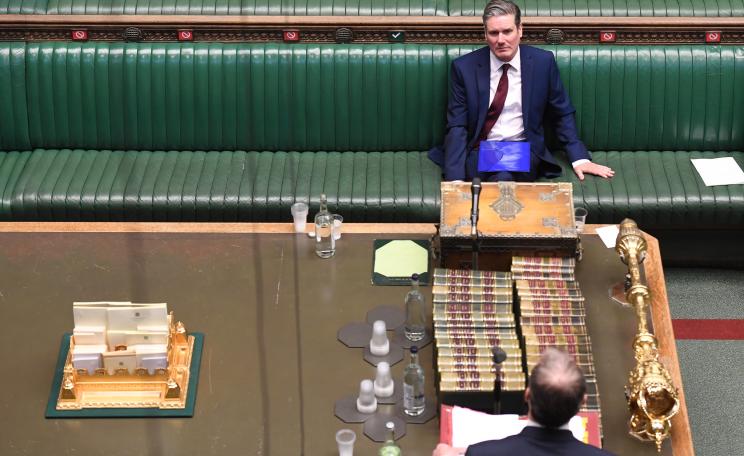Climate catastrophe could well precipitate a financial crisis unprecedented in scale if the transition to decarbonisation is left too late and rushed in the wake of catastrophe.
A decade on from the global financial crisis, we can partly understand its cause as a crash in the subprime mortgage market.
Banks began offering mortgages to people increasingly unlikely to make their repayments; packaged all those new lower quality 'sub-prime' mortgages up into bundles; and traded them pretending they were low-risk, all explained with far more detail and humour by Oscar-winning film The Big Short.
Eventually, people began defaulting on their mortgages, the sub-prime bundles became worthless, and trillions of dollars were lost.
Money heist
More instructively, we can understand the crisis as having multiple roots in the marketisation of housing, the limitless drive to accumulate wealth with little interrogation of longer-term consequences, and the deregulation of the financial sector which held the health of the global economy in its hand.
The story has been often told of how the gains of this reckless system were privatised and its losses socialised. This was a crisis of capitalism in decay and yet it was the fundamental logic of capitalism - enriching the richer and impoverishing the poor – which defined its winners and losers.
Bankers still received their bonuses while ‘austerity’ was imposed on the masses under the guise of fiscal prudence covering for an ideological crusade of wider deregulation and increasingly scandalous privatisation.
Earlier this year, a Spanish TV show, Money Heist, took Netflix by storm - becoming the platform’s most watched non-English language TV series on Netflix ever. It even rocketed Italian anti-fascist song Bella Ciao up the music charts globally.
Indeed, Bella Ciao was not featured in the show apolitically. The legacy of the partisan’s resistance defines the series’ underlying politics. It articulates a popular dissatisfaction with the financial system and the double standards applied to it compared with ordinary citizens.
Viewers are steered to join the show’s fictional public in sympathising with the heist which occupied The Royal Mint of Spain and printed nearly €1bn in protest.
The heist’s orchestrator explains how little cash they actually printed compared to quantities printed in recent years by the European Central Bank and sent directly to the pockets of bankers. “Did anyone say that the ECB was a thief? No. Liquidity injections they called it.”
Bankers’ bonuses
Compare the bonuses received by bankers responsible for the 2008 crash to the militarised police response, SWAT teams and gun fire directed at the heist. Compare the crimes.
Climate catastrophe could well precipitate a financial crisis unprecedented in scale if the transition to decarbonisation is left too late and rushed in the wake of catastrophe.
The obvious point that this fictional heist is not a coherent response to this unjust financial system in crisis doesn’t need to be laboured. However, it is significant that such protest so strongly captures the imagination of Money Heist’s fictional public and real viewers.
There has been no coherent alternative to the prevailing system of injustice on the table. For them, the poetic justice of a heist committing the same crime as the bankers and getting away with it just as they did will do.
This political helplessness may have been true in the setting, time and context of Money Heist – Spain, still feeling the effects of deep austerity. For many it still feels true.
But as movements for democratic socialism surge globally and the climate justice movement gets serious about what to do with power beyond protest, our critique of financialised capitalism need not end with unreconstructed expressions of disdain for its flagrant injustices – whether the protest movements of the early 2010s or Money Heist.
It may be 10 years later than ideal, but the proposal for fossil free finance is part of a wider program of radically transforming the role that finance plays in society. It must be an important part of our radical response to the financial crisis designed to capture popular imagination.
Carbon bubble
Underlying demands for fossil free finance is our analysis identifying the striking parallels between the financial crisis of capitalism in 2008 and today’s climate crisis.
Capital’s fundamental drive to accumulate by any means pushed the housing market to the brink punishing society’s most vulnerable - just as it pushes the climate to its limits while the poorest bear the brunt of its breakdown.
By financing the extraction of ever more fossil fuels and creating unnecessary markets to meet demand not for energy but financial speculation – knowing what they do about the consequences of unrestrained fossil fuel extraction - investment bankers are gambling with our climate just as they did so irresponsibly with our homes. It will end the same.
The market valuation of fossil fuels currently assumes all known reserves will be extracted and their value realised. The idea of a ‘carbon bubble’ recognises that to avoid catastrophic climate breakdown over 80 percent of reserves must stay in the ground. Citigroup predict the economy will haemorrhage over $100 trillion.
The housing bubble burst. The carbon bubble will burst. When it does, the severity of consequences for a global economy built on the foundations of assets suddenly stripped of value may mean we can never return to business-as-usual.
Real justice
Let’s be clear. Climate catastrophe could well precipitate a financial crisis unprecedented in scale if the transition to decarbonisation is left too late and rushed in the wake of catastrophe as tipping points are passed.
In this case, the story of climate injustice thus far would likely be reproduced. The financial sector and fossil fuel industry would be bailed out and the costs of financial collapse and climate breakdown laid at the feet of the poor.
Whereas Money Heist represents an unreconstructed discontent with this system nevertheless evoking sympathy of systematically disempowered and disposed public, there is only real justice in a radical transformation of the financial system and who it works for.
To avoid a climate change-induced financial crash, banks must divest themselves of finance for new fossil fuel infrastructure locking our economy into carbon intensive production.
Banks financing operations must be repurposed to fund a far-reaching program of investment in zero-carbon research and infrastructure to decarbonise the economy while empowering workers and communities whose livelihoods capital so readily gambles with.
More on how next time.
This Author
Chris Saltmarsh is co-director of climate change campaigns at People & Planet. He tweets at @chris_saltmarsh.







